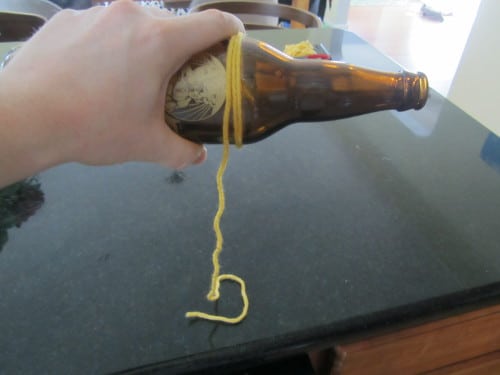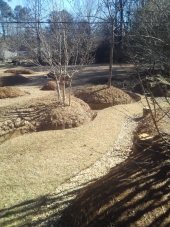I'm no expert, but I'll give you what I think.
First of all, it depends on what your trying to avoid. Just because the world changes doesn't necessarily mean humanity will end. Humans will adapt just as we always have. However, if you mean are we to late to prevent any change than yes, because change has already happened. However, change isn't necessarily good or bad. The earth is really in constant change, and as I said we have/will adapt (I'm not talking natural evolutionary adaption, I mean we will adapt the way we live to fit the world). The serious problem comes in if a change happens faster than we can adapt. I will get to that in a second. Basically change happened no matter what and we have the ability to adapt to some (but not all) change.
Now the more pressing matter is the degree of the change and how responsible we are for it. That is harder because I don't believe it is possible to know for sure. However, I will make the argument that the majority of climate change is not caused by humans but by the natural cycle climate change that has been going on for hundreds of thosands of years. Take a look at this graph: http://www.aip.org/history/climate/images/Vostok-Petit1999-A.jpg
*See note at bottom about measurements of historical climate change
Notice that we are approaching a peak assuming that the cycle continues. Now there are a couple things to note here. First of all, just because there is a cycle that correlates with current events DOES NOT mean we haven't caused anything. We have obviously put more greenhouse gases into the atmosphere and thus affected nature. However the degree of this is (to me) very unclear. Generally speaking you have two view points that are represented to the masses by popular media such as television shows and the news (both of which usually reflect the dumbest ideas and not the best or most innovative). First you have the train of thought that climate change is a myth and were all worried about nothing. On the other end of the spectrum we have the perspective that we a literally killing the earth all together and it's all our fault. In the limited research I have done, I have found no argument/evidence to convince me of either of these. I think it probably lands somewhere in the middle. Basically I assert that we are messing things up, but thing were also already changing. Regardless of what is happening, I still hold that humanity will not be destroyed by climate change.
One final note in response to your question, is you have said "reverse" climate change. There is a difference between "minimize further human affects on the climate" and "reverse climate change." Reversing climate change would involve some serious stuff like removing gases from the atmosphere. I suppose it might be possible but I honestly think that would be a bad idea. If we start reversing climate change we doing the same thing were doing now except in reverse. Were messing with nature. The design of the universe is pretty great (so great in fact that some have asserted is as an argument for the existence of God). Nature was doing a pretty great job doing it's thing up until one or two hundred years ago when humans started getting a little to cocky. My point is that by attempting to undo what we have already done, we could very easily do something wrong and make things worse than we started with. I think that smartest move at this point is to cut our loses, switch to a more "green" attitude as is practical, and pray for a better future.
While I am on this rant (this is way longer than I intended) I would like to touch on one other point. There are other problems than climate change. Now don't get me wrong, climate change is a big deal, but I think there are a lot of issues. We can't put so much emphasis on climate change that once we get it figured out we think that there is nothing left to fix. For example, I don't need to tell a permaculture fourm how bad some of our modern agriculture methods are. I mean I was reading not so long ago about the amount of arable land (land that can be used for agriculture) is left on earth. I also read how this was slowly dwindling because once land have been used for a long time it starts to lose it's potency. This kind of worried me because I realized that even if it doens't happen in my lifetime, someday people would literally run out of land to grow stuff on. Then I found out about permaculture, and I was like "hey, not only do we not have to run out of farm land, with there methods we can utilize land that isn't useful for conventional agriculture AND create more useable land. That is pretty neat." But then it occurred to me that just becuase we have the potential to do permaculture stuff doesn't means that most people will do it. And that applies to a lot of stuff these days. Agriculture, education, religion/ethics/morality, transportation, building stuff... and the list goes on. It seems like no matter where you look the common way of thinking is the wrong way of thinking. So am I worried about climate change? Sure. Am I worried about other stuff too? YES.
However, it doesn't have to be bad. There is still hope. They are hard to find, but there are nuggets of treasure if you search hard enough.
Let me end by saying, again, I am far from an expert. I make no claim of infallibility, and have simply presented information I have gathered with the conclusions I have formed from said information. I hope it can be helpful.
*NOTE: All of the information that we have about earths climate change history (I am taking hundreds of thousands of years here) we get from ice. I don't know all the details, but basically by measuring certain things in the ice and matching the depth with a time period they can estimate CO2, temps, etc. My point here is that we don't even know if this stuff is accurate for sure. For example I heard about a new discovery that there was ice that was forming on the BOTTOM of already existing ice. That is very unusual, but I suppose if the ice was cold enough it is possible. Anyway, if this is happening where ice samples come from then it could be a huge problem that would corrupt everything we know about climate change. However, this seems unlikely. My point is just that we don't know anything for sure.








